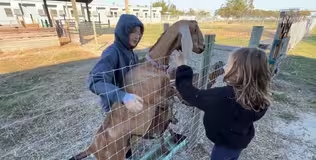
New college graduates face toughest job market in years
Clip: 8/10/2025 | 6m 25sVideo has Closed Captions
Why new college graduates are facing one of the toughest job markets in a decade
New college graduates are facing one of the most challenging markets for entry-level jobs in a decade. PBS News asked recent grads about their job searches, and John Yang speaks with Christine Cruzvergara, chief education strategy officer at Handshake, for more on the current state of the job market and advice for first-time job seekers.
Problems playing video? | Closed Captioning Feedback
Problems playing video? | Closed Captioning Feedback
Major corporate funding for the PBS News Hour is provided by BDO, BNSF, Consumer Cellular, American Cruise Lines, and Raymond James. Funding for the PBS NewsHour Weekend is provided by...

New college graduates face toughest job market in years
Clip: 8/10/2025 | 6m 25sVideo has Closed Captions
New college graduates are facing one of the most challenging markets for entry-level jobs in a decade. PBS News asked recent grads about their job searches, and John Yang speaks with Christine Cruzvergara, chief education strategy officer at Handshake, for more on the current state of the job market and advice for first-time job seekers.
Problems playing video? | Closed Captioning Feedback
How to Watch PBS News Hour
PBS News Hour is available to stream on pbs.org and the free PBS App, available on iPhone, Apple TV, Android TV, Android smartphones, Amazon Fire TV, Amazon Fire Tablet, Roku, Samsung Smart TV, and Vizio.
Providing Support for PBS.org
Learn Moreabout PBS online sponsorshipJOHN YANG: New college graduates are facing one of the most challenging markets for entry level jobs in a decade.
In June, the most recent data available, the unemployment rate for recent grads was nearly 5 percent.
That's higher than the overall unemployment rate.
We asked recent graduates to tell us about their job searches.
JACK O'CONNOR: My hope after graduating college was to go straight into a full time job in reporting.
ANJOLEIGH SCHINDLER: My initial plans were to find a local job in a magazine.
I just wanted to find a job where I could write.
MICHAEL LAVIN: I had aspirations of working for the GSA, General Services Administration.
I was going into a third round interview with them around November, December, and that is when the federal hiring freeze took over.
ANJOLEIGH SCHINDLER: I would often be what I would consider ghosted by employers.
Wouldn't get any feedback at all, not even a rejection, just nothing.
JACK O'CONNER: I must have started applying for jobs in April, and I know I've sent 85 job applications since.
It's been really difficult.
ANJOLEIGH SCHINDLER: When I wasn't getting any feedback from my applications, was really dejected.
So it made me feel like I was unqualified for any job in journalism, like maybe I wasn't good enough.
MICHAEL LAVIN: The experience has definitely been discouraging.
But I don't know.
I like to take the mindset of I just got to keep plugging away, keep sending in applications, keep trying to revamp my resume.
JACK O'CONNOR: I think I'm a little too stubborn to switch career paths right now.
So I, you know, I'm going to keep at it, keep applying, and we'll just hope for the best, I suppose.
JOHN YANG: Christine Cruzvergara is the Chief Education Officer at Handshake, which is an online platform that connects young job seekers and employers.
Christine, we just heard from three young people.
You heard disappointment, you heard a little frustration.
How typical is that from what you hear?
CHRISTINE CRUZVERGARA, Chief Education Officer, Handshake: It's very common right now.
The job market is tough, it's competitive.
We've seen in our data that jobs are down 15 percent from last year, but applications are up 30 percent.
JOHN YANG: What makes it so tough?
CHRISTINE CRUZVERGARA: Well, there are a number of different factors that make it difficult right now.
One would obviously be the overall economy, the second would be the government, and the third would be what's happening with AI, disrupting what entry level jobs look like right now.
JOHN YANG: Talk a little bit about the AI part of that.
We've heard some people say that AI is taking over the many of the tasks that entry level workers would normally do.
CHRISTINE CRUZVERGARA: So employers are going to have new expectations around how you use AI, how it's integrated into your role, the amount of productivity you have.
I think that altogether is going to mean that the skill set for an entry level worker will change and evolve and it will look different.
So for someone trying to graduate and find work, right now, they're in the middle of a very messy process where employers are trying to figure out what they want and what that looks like.
JOHN YANG: We heard one of the young men talking about he wanted to become a reporter, thinking about shifting fields, but wanted to avoid that.
He said he was stubborn enough that he didn't want to do it.
What are some of the sorts of tough choices or hard decisions that young people are having to face now as they look for their first jobs?
CHRISTINE CRUZVERGARA: We see in our data that over 40 percent are willing to actually explore other industries that perhaps do have more hiring right now.
For example, health care is still rising in terms of number of opportunities, and there aren't enough people who want to go into health care.
So some folks that have tech skills, for example, instead of working in a traditional tech industry, are thinking about, how might I do health tech, how can I pivot in that way?
So that's one type of difficult decision.
The second would be location.
Where do I want to live?
This generation, this class knows that it's extremely expensive to live in certain cities.
So the cost of living is factoring into their choices about where they choose to apply, what locations they want to live in.
I think a third piece is really considering what types of skills are they able to build and are they able to build it fast enough for what employers are looking for?
And employers are still figuring that out, so it could change from one year to another.
JOHN YANG: You mentioned health care is a place where there are a lot of opportunities.
Are there fields where that are sort of oversubscribed?
There are more people chasing after fewer jobs.
CHRISTINE CRUZVERGARA: Well, I think what we've seen just in the past year or two is that big tech, for example, has certainly slowed down in their hiring.
The class of 2025 in particular, has been watching headlines for the better part of two years since seeing major layoffs happen.
It is also the industry that is adopting Gen AI the fastest.
And so they are the ones kind of on the forefront of experimenting with what that looks like.
How much headcount do you really need?
How much could be paired with technology?
What will the future of engineering teams look like?
So that is certainly an industry where we have seen some slowdown.
JOHN YANG: What's your advice for the members of the class of 25 who are still out there looking for their first jobs?
CHRISTINE CRUZVERGARA: Well, I think first you have to find a support group, a support network that's going to keep you positive through the process.
It is tough, it is competitive, it is easy to feel rejected and dejected as you go through this process.
That can be your family, that can be your friends, it could be your coaches, it could be your peers.
Doesn't matter who, you just need to find someone.
I think the second piece is think about how you can upskill, so you have your degree.
Fantastic.
Are there other skills that you need to pair with that right now and take the advantage of all the online resources and all the free resources that are available to you and find ways to upskill yourself in the downtime while you are looking for a job?
And then lastly, remember that your first job is not your forever job.
So keep in mind that whatever that first job is, it's going to teach you some skills.
It's going to give you a chance to step up into the next thing.
But it doesn't have to be perfect.
And sometimes just releasing some of those expectations can help you find that next job a little faster.
JOHN YANG: Good advice.
From Christine Cruzvergara of Handshake, thank you very much.
CHRISTINE CRUZVERGARA: Thank you so much for having me.
Charter school weaves farm animal care into its curriculum
Video has Closed Captions
Clip: 8/10/2025 | 5m 51s | Academy at the Farm instills confidence in kids with lessons in animal care (5m 51s)
Netanyahu lashes out at critics of plan to occupy Gaza City
Video has Closed Captions
Clip: 8/10/2025 | 6m 20s | Netanyahu lashes out at critics of plan to occupy Gaza City as condemnation mounts (6m 20s)
News Wrap: EU stands with Ukraine before Trump-Putin summit
Video has Closed Captions
Clip: 8/10/2025 | 2m 33s | News Wrap: European leaders state support for Ukraine before Trump-Putin summit (2m 33s)
Providing Support for PBS.org
Learn Moreabout PBS online sponsorship
- News and Public Affairs

FRONTLINE is investigative journalism that questions, explains and changes our world.

- News and Public Affairs

Amanpour and Company features conversations with leaders and decision makers.












Support for PBS provided by:
Major corporate funding for the PBS News Hour is provided by BDO, BNSF, Consumer Cellular, American Cruise Lines, and Raymond James. Funding for the PBS NewsHour Weekend is provided by...


